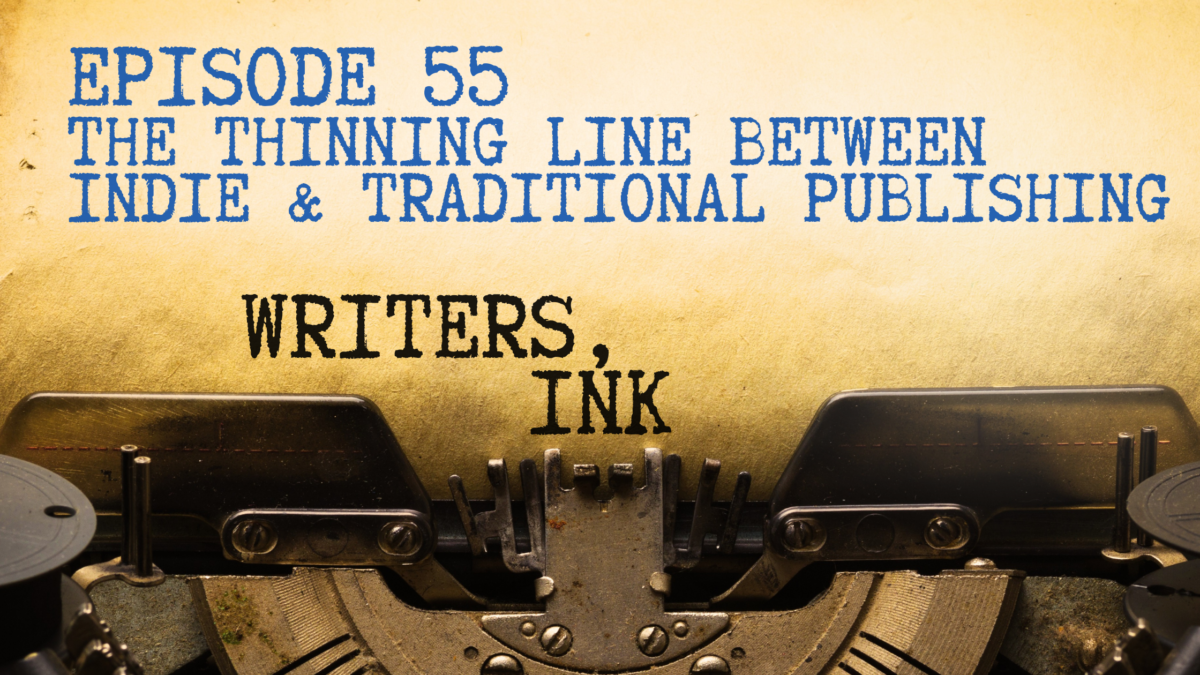

The Thinning Line Between Indie and Traditional Publishing
In this episode, J. and J.D. welcome indie mastermind Zach Bohannon to the show to discuss the growing similarities between indie and traditional publishing.
Whether you’re traditionally published or indie, writing a good book is only the first step in becoming a successful author. The days of just turning a manuscript into your editor and walking away are gone. If you want to succeed in today’s publishing world, you need to understand every aspect of the business – editing, formatting, marketing, contracts. It all starts with a good book, then the real work begins.
Join international bestselling author J.D. Barker and indie powerhouses, J. Thorn and Zach Bohannon, as they gain unique insight and valuable advice from the most prolific and accomplished authors in the business.
In this episode, you’ll discover:
- What’s the deal with Audiblegate?
- The benefits of being a “hybrid” author
- Why traditional publishers are starting to value eBooks
- Why indies are becoming more tolerant of traditional deals
- The importance of a mailing list when pursuing a trad deal
- The role of subscription-based services in the future of publishing
Links:
J. D. Barker – http://jdbarker.com/
J. Thorn – https://theauthorlife.com/
Zach Bohannon – https://zachbohannon.com/
Proudly sponsored by Kobo Writing Life – https://kobowritinglife.com/
Music by Nicorus – https://cctrax.com/nicorus/dust-to-dust-ep
Voice Over by Rick Ganley – http://www.nhpr.com and recorded at Mill Pond Studio – http://www.millpondstudio.com
Contact – https://writersinkpodcast.com/dev/contact/
*Full disclosure: Some of the links are affiliate links.





Christopher Wills
5 years ago
Interesting discussion today guys. However I question the subscription model. 3 reasons I don’t like it:
1. One can pay a ton of subscription fees without getting full value although whale readers will probably benefit.
2. I love owning books. I read many two or three times or more. I still have books I bought many years ago.
3. I have a music subscription and I enjoy music from my youth in the 60s and 70s but it keeps disappearing from the lists. Annoying. Even Neil Young… 😢
Great to hear Indie authors stating that a 5 star read is important. It has been painful for me to hear Indies say that the quality of writing is unimportant as long as one is good at marketing. It sometimes appears one can market poo and make a living.
Allied to this is the idea of ‘word of mouth.’ It was good to hear this because while a good cover, blurb and marketing might sell a book, it won’t sell the second and third book if the writing is poor. Only good writing can generate ‘word of mouth.’
I think the Indie world is awakening.
Great show.
J. Thorn
5 years ago
Those are valid reasons. But I think most people are willing to overlook that for the ease of use and convenience.
And yes, gone are the days of throwing up a Word doc to Amazon and having people buy it without question.
Jeff Elkins
5 years ago
The subscription model seems like it could be an “easy win” for a company like Barns-and-Nobel or even for one of the big publishers. I’ve seen several “book clubs” start to pop up that send a book a month, but the reader doesn’t have much choice in what they get. I keep waiting for an improved version of Good Reads that gamifys reading. Hallmark just released an app that allows you to check off the holiday movies you’ve watched and gives you rewards for completing levels. Seems like it would be a win for a company with the resources to do it. (Kobo? D2D? Anyone?)
As for the actual question of indie v trad, I struggle with this a lot. There are things as an indie that I absolutely hate doing. I don’t want to pick covers. I don’t want to negotiate with editors. I would love for someone to tell me how to fix my books. And if I could get someone to just take care of the formatting – amazing. Please. All that sounds great. At the same time, I have no patience, time, or motivation to do the work to find an agent and get involved in the query game. I did it for a month and couldn’t take it. So, I’m kind of stuck as an indie until I figure something else out. The goal is to earn enough money to start paying people to do all those things I hate.
J. Thorn
5 years ago
I hear you. Remember, it’s not an either/or. Maybe you pick one project and designate that as your “trad pub pursuit” and indie publish everything else.
Kev Partner
5 years ago
Interesting chat, as always. I disagree with your points of view on mailing lists. While organic back-of-the-book signups are certainly much higher quality, these are people who, by definition, already know you.
Using the reader magnet/list swap/group giveaway model does mean plenty of freebie seekers, but it also brings in people who’d never heard of you and who might become long time readers. I would rather get an extra thousand that way and have to weed out 900 over the following six months (based on engagement) because that way I’m ahead 100 good quality mailing list subscribers. Most of my superfans, beta readers and ARC team came via giveaways.
I completely agree that just focusing on list size is a vanity metric, but I like to cast my net wide and then throw the tiddlers back rather than miss the big fish entirely.
J. Thorn
5 years ago
10% would be amazing! My conversion from freebies/giveaways is probably closer to 1%.
S.A. Schneider
5 years ago
What! Why are we talking about thinning hair! Are you chiding me!? 🙂
If the reality is that subscription models are here and becoming a larger part of the industry, then we need to figure out how to use it. It’s really that way for any new or changed things in the industry. Evolve. It may not always be good, but if there are millions of readers only using subscription, you’re beating your head against the wall fighting it.
And it goes back to – build your list and readers and have them order from you directly. In the long run, you have to worry less about every thing else when you control more and more.
J. Thorn
5 years ago
So true!
And we promise not to bring up your hair again.
Tory Element
5 years ago
Hey, nice to hear Zach on the show in addition to J and J. My first thought when I heard the big topic question is, with the option to try for trad publishing or the certainty of going indie publishing, why would I opt for 25% of the take when I can reap as much as 70%-95% as an indie? I can think of a couple of good reasons to try for trad, validation and a support team. But on the flip side, you have near zero control and few rights with trad publishing. Again, why would you want that? I suppose to boils down to your pain point and end goal. Since I started my writing/author career, I’ve become more convinced that the indie route is far better in the long run. And lately, I’ve begun to solidify my stance on going wide but also eventually generating the majority of my book income from sales off of my own site. I’m perfectly happy with taking the time to build up to this goal while retaining the most possible control of the outcome. I plan to live another 68 years so I have some time.
My thoughts on where trad is, should, and might someday go. The current trad model is all but obsolete. Like Borders Books and Blockbuster video, they are late to the party. It should be no surprise to see a big merger, the pandemic simply moved up the inevitable. I think S.A. is correct, the subscription model for ebooks is coming so indie authors may as well start including that in their marketing strategy. Which in and of itself is a strong reason to go wide. But, if I were big trad, I’d transition into a hybrid layered or ala-carte service that would combine the benefits of both trad and indie publishing, with layered or tiered packages at different price points to accommodate various need, or pain levels if you will, for each author. They could become a Reedsy only bigger, for example. This would necessitate an altered or updated mindset for the trad company who does this first (which will be hard for them because they have deep set roots and ways).
Either way, authors need to educate themselves on both routes and on the pros and cons of both and decide what’s best for them at the time while continuously reevaluating their status and end goals, which will change over time. I have no plans to go traditional (nor exclusive), though I will be ready IF a trad agent comes knocking (or a motion picture agent). Until then I have a plan and am plotting and plodding along while enjoying podcasts like the Writer’s Ink. Thanks guys.
TE
J. Thorn
5 years ago
I don’t disagree with any of this. I think you’re right in that trad pub is going to have to re-evaluate their paradigm. Their customers will be readers, not bookstores. Quite a novel concept, eh? (pun intended)
tory element
5 years ago
Yep, it will have to change into something much leaner. Will probably put many out of work as it transitions into an ecosphere of independent task providers, like editors, cover designers, formatters, etc., but all under one roof. Could potentially employ more people while reducing corp overhead. The rights might become more of a mess, though, and authors would have to read the contracts carefully so as not to give something vital away inadvertently. This might become a good thing giving authors more options and thus more competition overall. We shall soon see I reckon.